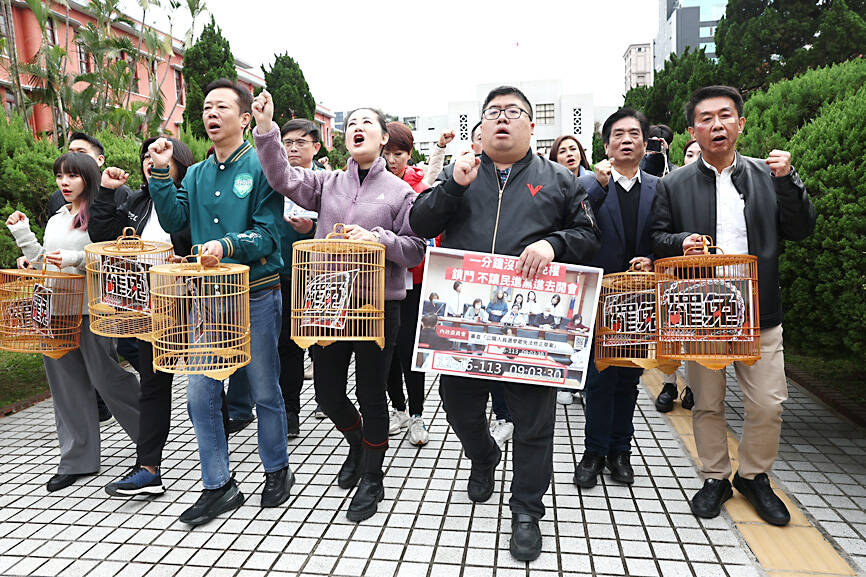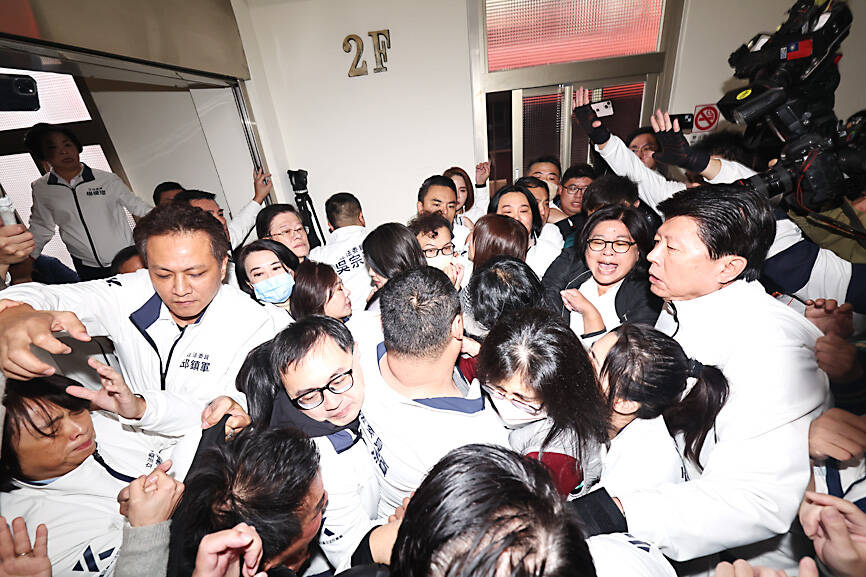Scuffles broke out at the legislature yesterday between Chinese Nationalist Party (KMT) and Democratic Progressive Party (DPP) lawmakers ahead of an Internal Administration Committee meeting to review draft amendments to the Civil Servants Election and Recall Act (公職人員選舉罷免法).
At the beginning of the 9am meeting, KMT legislators occupied the podium and blocked DPP lawmakers from entering the room.
Committee convener Hsu Hsin-ying (徐欣瑩) of the KMT announced the unanimous passage of the preliminary review of the draft amendments at 9:02 am and concluded the meeting at 9:03 am.

Photo: CNA
In preparation for yesterday’s review session, several KMT lawmakers gathered outside the conference room late on Sunday, blocking one side of the hallway with chairs and sealing the door with tape, leaving a single entrance and exit. The KMT lawmakers also used their bodies to block the other side.
Scuffles broke out at 6am when DPP legislators realized they could not enter the room.
The approved amendments aim to raise the threshold for a recall, including one that requires the number of recall votes to exceed the votes an official originally received when elected.

Photo: CNA
Under the current law, a recall proposal is approved if the number of votes supporting the recall exceeds the number of votes opposing it. Additionally, the number of supporting votes must be at least one-quarter of the total number of votes cast in the election.
The DPP contended that the proposal would make it difficult for elected officials to be recalled.
DPP lawmakers assembled outside the legislative chamber at 9:40am for a news conference, carrying placards that accused the KMT of depriving citizens of the right to vote to remove unfit politicians.

Photo: CNA
They also wielded signs saying: “Martial law in the legislature, bullying against democracy.”
“KMT legislators took hostile actions to bar DPP members from attending the committee meeting by locking the door and physically blocked us from entering,” DPP caucus chief executive Rosalia Wu (吳思瑤) said.
“The KMT had set up an ‘iron gate’ to bar DPP members from the meeting,” committee co-covener DPP Legislator Chang Hong-lu (張宏陸) said. “If this continues, the KMT will play its own game and be further emboldened to expand legislative powers and take away the democratic rights of our citizens.”
Separately, DPP Secretary-General Lin Yu-chang (林右昌) said that as well as KMT caucus whip Fu Kun-chi (傅?萁), KMT Chairman Eric Chu (朱立倫) and Legislative Speaker Han Kuo-yu (韓國瑜) must take responsibility for “this new martial law tactic. They must apologize to all citizens and rectify the issue by referring the bill back to the committee for review.”
In response, Fu said that DPP lawmakers had paralyzed the legislature numerous times.
He said several DPP lawmakers showed up at the committee door on Sunday night, threatening to fight the bill by stopping yesterday’s meeting from taking place.
Fu said the KMT had to safeguard the podium in the committee room, to defend the rights of the public and ensure committee meetings can proceed smoothly.
Additional reporting by Bloomberg

‘DANGEROUS GAME’: Legislative Yuan budget cuts have already become a point of discussion for Democrats and Republicans in Washington, Elbridge Colby said Taiwan’s fall to China “would be a disaster for American interests” and Taipei must raise defense spending to deter Beijing, US President Donald Trump’s pick to lead Pentagon policy, Elbridge Colby, said on Tuesday during his US Senate confirmation hearing. The nominee for US undersecretary of defense for policy told the Armed Services Committee that Washington needs to motivate Taiwan to avoid a conflict with China and that he is “profoundly disturbed” about its perceived reluctance to raise defense spending closer to 10 percent of GDP. Colby, a China hawk who also served in the Pentagon in Trump’s first team,

SEPARATE: The MAC rebutted Beijing’s claim that Taiwan is China’s province, asserting that UN Resolution 2758 neither mentions Taiwan nor grants the PRC authority over it The “status quo” of democratic Taiwan and autocratic China not belonging to each other has long been recognized by the international community, the Mainland Affairs Council (MAC) said yesterday in its rebuttal of Beijing’s claim that Taiwan can only be represented in the UN as “Taiwan, Province of China.” Chinese Minister of Foreign Affairs Wang Yi (王毅) yesterday at a news conference of the third session at the 14th National People’s Congress said that Taiwan can only be referred to as “Taiwan, Province of China” at the UN. Taiwan is an inseparable part of Chinese territory, which is not only history but

CROSSED A LINE: While entertainers working in China have made pro-China statements before, this time it seriously affected the nation’s security and interests, a source said The Mainland Affairs Council (MAC) late on Saturday night condemned the comments of Taiwanese entertainers who reposted Chinese statements denigrating Taiwan’s sovereignty. The nation’s cross-strait affairs authority issued the statement after several Taiwanese entertainers, including Patty Hou (侯佩岑), Ouyang Nana (歐陽娜娜) and Michelle Chen (陳妍希), on Friday and Saturday shared on their respective Sina Weibo (微博) accounts a post by state broadcaster China Central Television. The post showed an image of a map of Taiwan along with the five stars of the Chinese flag, and the message: “Taiwan is never a country. It never was and never will be.” The post followed remarks

INVESTMENT WATCH: The US activity would not affect the firm’s investment in Taiwan, where 11 production lines would likely be completed this year, C.C. Wei said Investments by Taiwan Semiconductor Manufacturing Co (TSMC, 台積電) in the US should not be a cause for concern, but rather seen as the moment that the company and Taiwan stepped into the global spotlight, President William Lai (賴清德) told a news conference at the Presidential Office in Taipei yesterday alongside TSMC chairman and chief executive officer C.C. Wei (魏哲家). Wei and US President Donald Trump in Washington on Monday announced plans to invest US$100 billion in the US to build three advanced foundries, two packaging plants, and a research and development center, after Trump threatened to slap tariffs on chips made